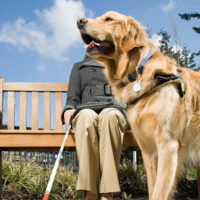Protections for Disabled Individuals Under the ADA: Service Animals

Both federal and state law prohibits discrimination against those with disabilities, both in the employment setting, and the public accommodation setting. This means that most businesses are required to take certain steps to ensure that disabled individuals have reasonable access to their property, which includes allowing them to use service animals.
What Qualifies as a Service Animal?
The ADA prohibits state and local governments, businesses, and nonprofit organizations from refusing access to someone with a disability just because he or she has a service animal. This includes, but is not limited to: mass transit stations, restaurants, workplaces, hotels, transportation vehicles, and apartment complexes. In order to receive these protections, however, a person’s service animal must satisfy the ADA’s definition, which describes a service animal as any dog that is individually trained to perform tasks for the benefit of someone with a disability. Furthermore, the tasks performed by the animal must be directly related to the owner’s disability. Examples of tasks that satisfy this definition include:
- Assisting those who are blind with navigation;
- Alerting individuals who are deaf to the presence of other people;
- Providing rescue work or non-violent protection;
- Pulling a wheelchair;
- Helping the owner during a seizure;
- Alerting an owner to the presence of allergens;
- Retrieving medicine and other items;
- Providing physical support to help individuals who have mobility problems; and
- Preventing the impulsive behaviors of those with psychiatric disabilities or neurological problems.
The law does not consider the provision of companionship or comfort to be a covered task under the ADA. Currently, the ADA only recognizes dogs as service animals. Other kinds of animals, even when specially trained, do not satisfy the definition. Florida law, on the other hand, allows dogs as well as miniature horses to qualify as service animals.
ADA Protections
As long as a person’s animal satisfies the ADA’s definition, he or she is protected from discrimination, which includes being:
- Barred from accessing public accommodations;
- Isolated from other patrons because of a service animal;
- Treated less favorably than other clients or customers;
- Charged fees that are not charged to other patrons; or
- Denied housing because of the animal.
Furthermore, business owners or employees can only ask someone with a service animal to leave a property when:
- The animal is out of control and its handler cannot control it; or
- The animal is not housebroken.
Finally, public accommodations are not permitted to ask about the extent or nature of a person’s disability, but can ask:
- Whether an animal is required because of a disability; and
- What tasks the animal has been trained to perform.
However, property owners cannot even make these inquiries if it is readily apparent that the animal was trained specifically to help an individual with a disability.
Call Today to Schedule a Consultation With an Experienced Public Accommodations Attorney
Individuals who use service animals have certain rights and cannot be excluded from public places. If you are disabled or are a business owner who wants to learn more about the ADA, contact Saady & Saxe, P.A. Attorneys At Law by calling 813-909-8855 to speak with a knowledgeable Florida attorney who can evaluate your case.
Resource:
ada.gov/regs2010/titleIII_2010/titleIII_2010_regulations.htm
